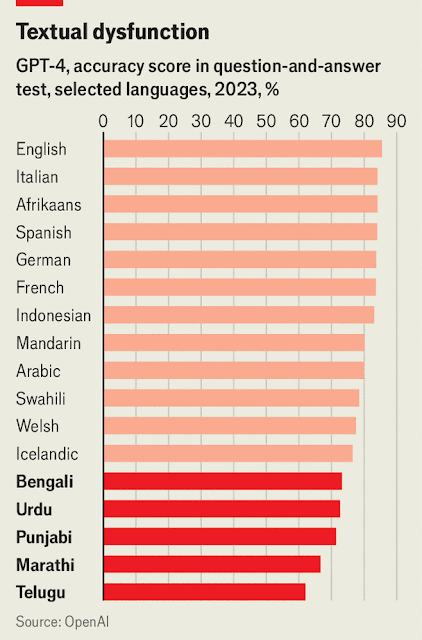
Pakistan to Develop Urdu LLM for Generative AI
By Riaz Haq
CA

National University of Science and Technology (NUST), National Information Technology Board (NITB) and Telecom network operator Jazz have signed a Memorandum of Understanding (MOU) to develop Pakistan’s first indigenous Large Language Model (LLM) with focus on Urdu, including datasets for Pashto and Punjabi languages. It is aimed at empowering individuals, businesses, and organizations with advanced AI tools in their native languages.
The envisioned LLM is expected to drive innovation in Generative AI applications, boosting productivity and accessibility in critical sectors like healthcare, education, and agriculture.

|
GPT-4 Accuracy Scores - Source The Economist |
Generative AI tools such as ChatGPT are powered by large language models, or LLMs. These models need to be trained on vast amounts of data in specific languages to be useful. Unfortunately, the Urdu content of the Internet is less than 0.1% . This will present a challenge for the developers of Urdu LLMs.

|
Online content of various languages - Source: W3Techs |
Lack of Urdu content available for training ChatGPT affects the accuracy of the results for Urdu language users. For example, the GPT-4 accuracy score in question-answer tests in Urdu is just over 70%, compared with 85% accuracy score in the English language, according to data from OpenAI. Other South Asian languages, including Hindi, Bengali, Punjabi, Marathi and Telugu, suffer from the same problem.
It's not just a South Asian problem. These challenges exist in the developing world. Non-European languages are generally poorly represented online. It's a major obstacle for non-European nations in developing their own generative artificial-intelligence (AI) models, which rely on vast amounts of training data. Generative artificial intelligence (AI) can produce biased results due to a number of factors, including the data it's trained on, the algorithms used, and how it's deployed.
The use of AI in developing nations such as Pakistan will remain limited to a small number of people proficient in the use of the English language. Broadening the adoption of AI applications will require LLMs trained on local language content. The absence of this development could cost Pakistan the opportunity to take full advantage of the AI Revolution .
(Riaz Haq is a Silicon Valley-based Pakistani-American analyst and writer. He blogs at www.riazhaq.com)

